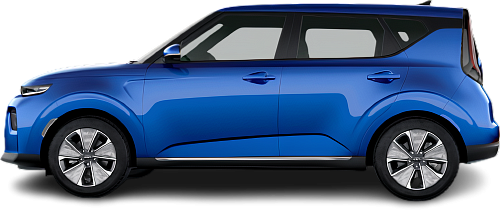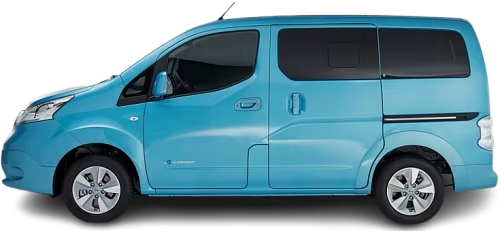Global EV Comparison: Kia Soul EV Standard Range vs Nissan e-NV200 Evalia 40 kWh
Struggling to Decide? Let AI Help!
Your AI Summary Is Ready!
General Info
The Kia Soul EV Standard Range (2020-…) is currently produced, it has a starting price of €38418. The Nissan e-NV200 Evalia 40 kWh (2018-2021) has been discontinued. You can find it for as low as €8900 on the used car market.
The Kia Soul EV Standard Range (2020-…) is a SUV, whereas the Nissan e-NV200 Evalia 40 kWh (2018-2021) is a Minivan.
| Property | Kia Soul EV Standard Range | Nissan e-NV200 Evalia 40 kWh |
|---|---|---|
| Years of Production | 2020-… | 2018-2021 |
| Current Status | Produced | Discontinued |
| Country of Manufacture | South Korea | Spain |
| Body Style | SUV | Minivan |
| Market Availability | EU | EU |
| Price Europe (New) | €38418 | - Price Europe (New) |
| Price Europe (Used) | €15999 | €8900 |
| GCC Score | 5.1 | 4.9 |
Range and Efficiency
The Kia Soul EV Standard Range (2020-…) boasts a greater real-world range, a larger battery, and superior energy efficiency compared to the Nissan e-NV200 Evalia 40 kWh (2018-2021).
| Property | Kia Soul EV Standard Range | Nissan e-NV200 Evalia 40 kWh |
|---|---|---|
| Range (WLTP) | 276 km | 200 km |
| Range (GCC) | 235 km | 190 km |
| Battery Capacity (Nominal) | 42 kWh | 40 kWh |
| Battery Capacity (Usable) | 39.2 kWh | 37 kWh |
| Efficiency per 100 km | 16.7 kWh/100 km | 19.5 kWh/100 km |
| Efficiency per kWh | 5.99 km/kWh | 5.14 km/kWh |
| Range and Efficiency Score | 5.4 | 4.3 |
Charging
Both vehicles utilize a standard 400-volt architecture.
The Nissan e-NV200 Evalia 40 kWh (2018-2021) offers faster charging speeds at DC stations, reaching up to 50 kW, while the Kia Soul EV Standard Range (2020-…) maxes out at 44 kW.
The Kia Soul EV Standard Range (2020-…) features a more powerful on-board charger, supporting a maximum AC charging power of 7.2 kW, whereas the Nissan e-NV200 Evalia 40 kWh (2018-2021) is limited to 6.6 kW.
| Property | Kia Soul EV Standard Range | Nissan e-NV200 Evalia 40 kWh |
|---|---|---|
| Max Charging Power (AC) | 7.2 kW | 6.6 kW |
| Max Charging Power (DC) | 44 kW | 50 kW |
| Architecture | 400 V | 400 V |
| Charge Port | CCS Type 2 | CHAdeMO |
| Charging Score | 4 | 3.6 |
Performance
Both vehicles are front-wheel drive.
The Kia Soul EV Standard Range (2020-…) boasts greater motor power and accelerates faster from 0 to 100 km/h.
| Property | Kia Soul EV Standard Range | Nissan e-NV200 Evalia 40 kWh |
|---|---|---|
| Drive Type | FWD | FWD |
| Motor Type | PMSM | IM |
| Motor Power (kW) | 100 kW | 80 kW |
| Motor Power (hp) | 134 hp | 107 hp |
| Motor Torque | 395 Nm | 254 Nm |
| 0-100 km/h | 9.9 s | 14 s |
| Top Speed | 157 km/h | 123 km/h |
| Performance Score | 3.1 | 1.6 |
Dimensions
The Nissan e-NV200 Evalia 40 kWh (2018-2021) is longer and taller, but the Kia Soul EV Standard Range (2020-…) is wider.
The Nissan e-NV200 Evalia 40 kWh (2018-2021) boasts a more extended wheelbase.
| Property | Kia Soul EV Standard Range | Nissan e-NV200 Evalia 40 kWh |
|---|---|---|
| Length | 4195 mm | 4560 mm |
| Width (with Mirrors) | - Width (with Mirrors) | 2011 mm |
| Width (w/o Mirrors) | 1800 mm | 1755 mm |
| Height | 1605 mm | 1858 mm |
| Wheelbase | 2600 mm | 2725 mm |
Cargo and Towing
The Nissan e-NV200 Evalia 40 kWh (2018-2021) provides more cargo capacity, featuring both a larger trunk and more space with the rear seats folded.
Neither car is equipped with a frunk (front trunk).
Neither vehicle is officially rated for towing in in the EU.
| Property | Kia Soul EV Standard Range | Nissan e-NV200 Evalia 40 kWh |
|---|---|---|
| Number of Seats | 5 | 7 |
| Curb Weight | 1610 kg | 1689 kg |
| Cargo Volume (Trunk) | 315 l | 443 l |
| Cargo Volume (Max) | 1339 l | 2940 l |
| Cargo Volume (Frunk) | - Cargo Volume (Frunk) | - Cargo Volume (Frunk) |
| Towing Capacity | - Towing Capacity | - Towing Capacity |
| Cargo and Towing Score | 5.5 | 7.5 |




